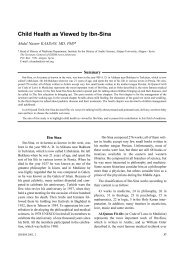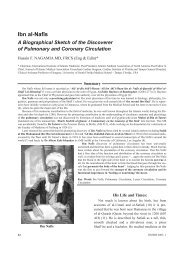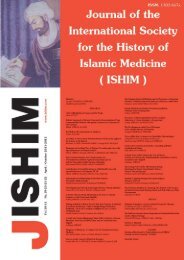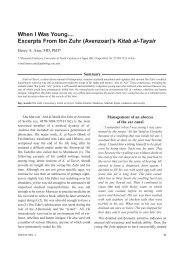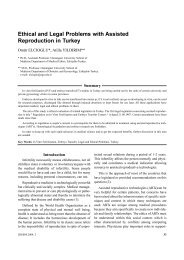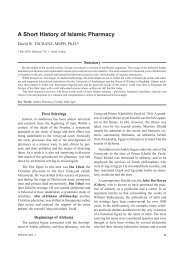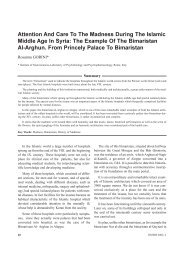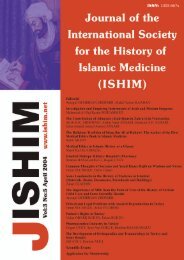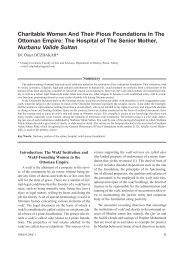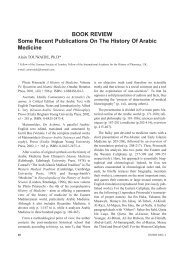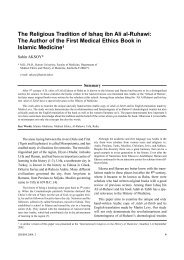Child Health as Viewed by Ibn-SinaAbdul Nasser KAADAN, MD, PhD** Head of <strong>History</strong> of <strong>Medicine</strong> Department, Institute for the <strong>History</strong> of Arabic Science, Aleppo University, Aleppo - SyriaThe Secretary General of ISHIM (www.ishim.net).P.O. Box: 7581, Aleppo, SyriaE-mail: a.kaadan@scs-net.orgSummaryIbn-Sina, or Avicenna as known in the west, was born in the year 980 A. D. in Afshana near Bukhara in Turkistan, which is nowcalled Uzbekistan. He left Bukhara when he was 21 years of age, <strong>and</strong> spent the rest of his life in various towns in Persia. He composed276 works; all of them written in Arabic except very few small books written in his mother tongue Persian. Al-Qanun Fit-tib(or Code of Laws in <strong>Medicine</strong>) represents the most important work of Ibn-Sina, <strong>and</strong> as Osler described it, the most famous medicaltextbook ever written. In the first book Ibn-Sina devoted a special part for talking about children bringing up <strong>and</strong> their diseases, <strong>and</strong>he called it (The first education in bringing up). This part consists of four chapters: The first chapter is for the management of thenewborn until the walking age. In the second chapter he talks about milk feeding, the characters of the good wet nurse <strong>and</strong> weakling.In the third chapter he talked about pediatric diseases <strong>and</strong> their treatments. The fourth chapter was devoted to children managementuntil adulthood.In al-Orjozah fi-ttib, Ibn-Sina devoted fifty-six verses for talking briefly about prenatal <strong>and</strong> postnatal care, delivery, newborn babycare <strong>and</strong> how to choose the suitable wet nurse.The aim of this study is to highlight child health as viewed by Ibn-Sina, <strong>and</strong> to present his contribution in this field of medicine.Ibn SinaIbn-Sina, or Avicenna as known in the west, wasborn in the year 980 A. D. in Afshana near Bukharain Turkistan, which is now called Uzbekistan. He leftBukhara when he was 21 years of age, <strong>and</strong> spent therest of his life in various towns in Persia. When hedied in the year 1037 he was known as one of thegreatest philosopher in Islam, <strong>and</strong> in <strong>Medicine</strong> hewas highly regarded that he was compared to Galen,so he was known as the Galen of Islam. Because ofhis great celebrity, many nations disputed <strong>and</strong> competedto celebrate his anniversary. Turkish were thefirst who revive his anniversary in 1937, when theyheld a great meeting for the occasion of nine hundredyears since his death. Then Arabs <strong>and</strong> Iranians followedthem by holding two festivals in Baghdad in1952, then in Tehran in 1954. To appreciate his contributionin developing the philosophical <strong>and</strong> medicalsciences, in 1978 UNESCO invited all its members tocelebrate the anniversary of one thous<strong>and</strong> years sincehis birth. All the members participated in the celebration,which was held in 1980.Ibn-Sina composed 276 works; all of them writtenin Arabic except very few small books written inhis mother tongue Persian. Unfortunately, most ofthese works were lost, but there are still 68 books ortreatises available in the eastern <strong>and</strong> westernlibraries. He composed in all branches of science, buthe was more interested in philosophy <strong>and</strong> medicine.Some recent historians consider him as a philosophermore than a physician, but others consider him as aprince of the physicians during the Middle Ages.The classification of Ibn-Sina works according totheir content is as follow:43 works in medicine, 24 in philosophy, 26 inphysics, 31 in theology, 23 in psychology, 15 inmathematics, 22 in logic, 5 in the Holy Koran interpretation.In addition, many treatises in asceticism,love, music <strong>and</strong> some stories.Al-Qanun Fit-tib: (or Code of Laws in <strong>Medicine</strong>)represents the most important work of Ibn-Sina,which is written in Arabic, <strong>and</strong> as William Oslerdescribed it, the most famous medical textbook everJISHIM 2003, 237
Abdul Nasser KAADANCHILD HEALTH AS VIEWED BY IBN-SINAwritten. This book is considered a unique reference ordocument containing all medical knowledge, as itaccumulated through many civilizations until thetime of Ibn-Sina himself.In his way of explanation Ibn-Sina was very closeto the way which modern medical textbooks followregarding classification, causes of diseases, epidemiology,symptoms <strong>and</strong> signs, treatment <strong>and</strong> prognosis.In this respect we can say that the excellence in itsarrangement <strong>and</strong> comprehensiveness made al-Qanunbook the most widespread in the <strong>Islamic</strong> <strong>and</strong>European countries. Al-Qanun book was known tothe Europeans through the Latin translations ofGerard of Cremona in the 15 th century, <strong>and</strong> remainedin use in medical schools at Louvain <strong>and</strong> Montpellieruntil the 17 th century, <strong>and</strong> according to the Journal ofUNESCO, October issue, 1980, the Qanun bookremained in use in Brussels University until 1909.By the 12 th century awareness set in that thesecompendia were too large to be really useful forready reference. Consequently, epitomes of theQanun were produced to make the ideas more quicklyaccessible, <strong>and</strong> commentaries were written to clarifythe contents. The most popular of all the epitomeof the Qanun was that called Kitab al-Mujiz fil Tibbor the Concise Book in <strong>Medicine</strong>. It was written inSyria by Ibn-al-Nafis, who died in 1288.Ibn-Sina begins his book al-Qanun by definitionmedicine by saying: <strong>Medicine</strong> is a science, fromwhich one learns the states of the human body, withrespect to what is healthy <strong>and</strong> what is not, in order topreserve good health when it exists, <strong>and</strong> restore itwhen it is lacking.Al-Qanun book consists of five books, the firstconcerned with general medical principles. The secondwith materia medica. The third with diseasesoccurring in a particular part of the body. The fourthon diseases not specific to one bodily part (such asfevers), in addition, to traumatic injuries such as fractures<strong>and</strong> dislocations of bones <strong>and</strong> joints. With thefinal book containing a formula giving recipes forcompound remedies.In the first book Ibn-Sina devoted a special partfor talking about children bringing up <strong>and</strong> their diseases,<strong>and</strong> he called it (The first education in bringingup). This part consists of four chapters:The first chapter is for the management of thenewborn until the walking age. In this chapter we canfind the concepts of Ibn-Sina <strong>and</strong> all other physiciansbefore him regarding issues, which are necessary tobe carried out for every newborn baby. He says thatafter delivery the umbilical cord should be cut for adistance of four fingers breadth, <strong>and</strong> ligated by usinga wool string, then a b<strong>and</strong>age dipped by oil appliedon. All of his body should be washed, with a necessityof dropping inside his eyes, <strong>and</strong> the nose orificesshould be cleaned. Then Ibn-Sina talked about thenewborn bathing, dressing <strong>and</strong> sleeping.In the second chapter he talks about milk feeding,the characters of the good wet nurse <strong>and</strong> weakling. Inthis regard Ibn-Sina stresses on the necessity of doingall efforts to keep the newborn on his mother milkfeedingas possible, because it is in its essence likehis feeding during the embryonic stage. Regardingweakling Ibn-Sina says that it should be gradually,<strong>and</strong> should be given first light foot such as light meetwith soup. Then he stressed on the necessity of notenforcing the baby to sit or st<strong>and</strong> before he could performthat by him self.In the third chapter he talked about pediatric diseases<strong>and</strong> their treatments. Among these diseases are:gum tumors, aphtha, xophthalmous, thrush, ear pain<strong>and</strong> discharge, difficult breathing, cough, commoncold, throat tumors, diarrhea, vomiting, hiccup,abdominal cramp, rectal prolapse, tenismus, worms,crying, sleeping disorders, bad dreams.The fourth chapter was devoted to children managementuntil adulthood. In this chapter Ibn-Sinatalks about the moral <strong>and</strong> emotional education of thechildren, revealing his opinions in this regard.In the other chapters of al-Qanun book we canfind some remarks related to pediatric diseases suchas: bed wetting, convulsions, measles, smallpox <strong>and</strong>some congenital deformities.When he talked about traumatic dislocation of thehip, Ibn-Sina says that this dislocation may developbefore or just after delivery, mentioning to what isknown now congenital dislocation of the hip.Al-orjozah fi-ttib (<strong>Medicine</strong> in a poem)This is considered the second most importantmedical works of Ibn-Sina after al-Qanun. Ibn-Sina38 JISHIM 2003, 2



